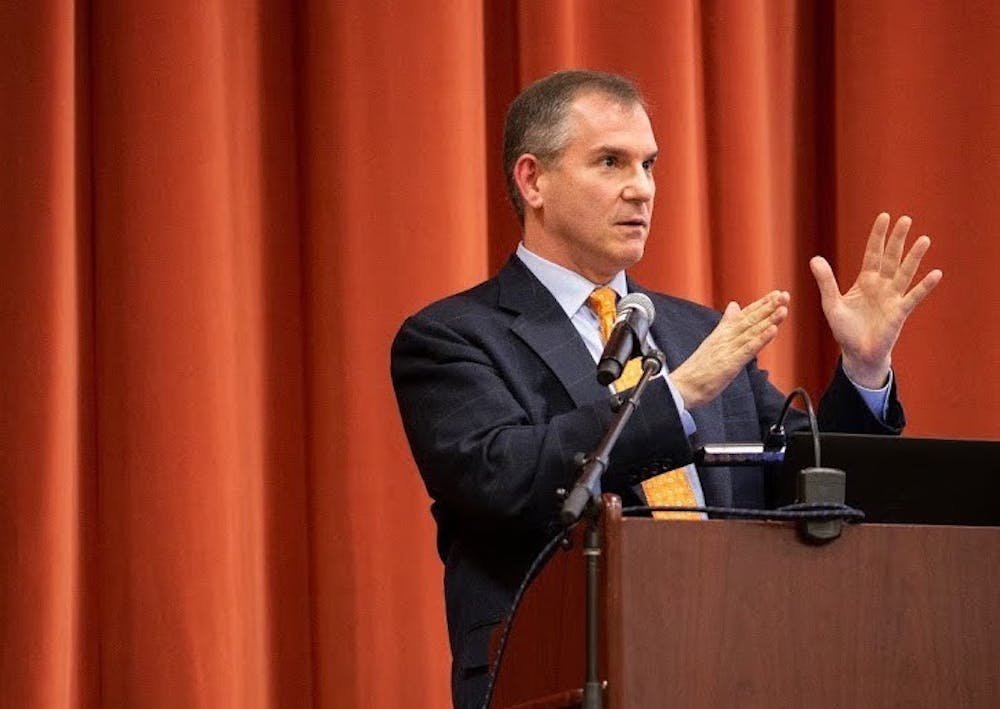New York Times op-ed columnist Frank Bruni spoke to a packed Wilson Hall about identity politics and the meaning of a liberal education last week. The community conversation was brought to campus by the Vermont Humanities Council and followed the question-based format designed by the college’s Engaged Listening Project.
Bruni was introduced by Sarah Stroup, associate professor of political science and faculty director of the Engaged Listening Project. The Engaged Listening project began this year with support from the Andrew W. Mellon Foundation. It aims to promote productive disagreements in academic settings and reformat talks in a way that facilitates audience involvement and deepens audience engagement.
“We hope to hear from many members of the community about the new format,” Stroup said in an interview after Bruni’s lecture. “Anecdotally, many people have told me they enjoyed the discussion with their neighbors. I have also heard about a lot of vigorous discussion of the merit of Bruni’s arguments, and that’s good — a valuable campus talk is one that prompts continued conversation.”
Middlebury students may recognize Bruni from his columns about free speech and safe spaces following the 2017 protests of Charles Murray. Bruni, a graduate of the University of North Carolina at Chapel Hill and the Columbia University School of Journalism, has also covered topics ranging from food to politics since starting at the Times in 1995. He began publishing biweekly opinion columns on politics, social issues, education and culture in 2011 and is the author and co-author of several books.
Bruni began his lecture by addressing the students in attendance, describing college as a time of immense personal change.
“I hope you use these years to become a bigger person rather than a smaller one, and to become a broader person rather than a narrower one,” he said. He then urged everyone present, no matter their age, to push back, ideologically, against a world that is “constantly trying to narrow us.”
[pullquote speaker="Bruni" photo="" align="center" background="on" border="all" shadow="on"]I hope you use these years to become a bigger person rather than a smaller one, and to become a broader person rather than a narrower one.[/pullquote]
Bruni continued by discussing the internet and social media, saying that these things meant to expand the world actually “trap us in sameness, giving us not diverse experiences, but versions of the same experience over and over again.” Most people only follow sources that echo their own perspectives, he said, which eliminates nuance and “lets us basically marinate in our own convictions.” On many social media platforms, for example, the more a user interacts with a particular topic or viewpoint, the more they see it recommended to them.
At Middlebury, students “encounter unfamiliar terrain and new perspectives,” Bruni said, “and the whole point of being here is to venture across that terrain and to explore it.” While colleges owe students physical safety and equal opportunity, it is a disservice, he said, to provide — or attempt to provide — students with an emotionally or ideologically safe environment. Rather, he argued, colleges should aim to promote intellectual strength over ideological security.
“Never,” Bruni said, “should students be given the idea that it’s okay to flee from, or wall out, arguments that are provocative, ideas that are uncomfortable, viewpoints that offend.”
Bruni spoke about his own experience as a gay college student in the 1980s, his determination to be open about his sexuality, his fear of coming out to his devout Christian roommate and his roommate’s unexpected acceptance of his identity. Both Bruni and his roommate grew intellectually from their situation, but Bruni questioned the likelihood of such a scenario occurring today, with colleges’ emphasis on safe spaces.
“There’s a difference,” he said, “between banding together and interpreting and talking about the world only through the lens of one’s race, religion, sexual orientation, gender identity. There’s a difference between banding together and admonishing outsiders that they can never understand you.”
After an audience member asked him to elaborate on this idea, Bruni said that he believes it is possible, and important, for people outside of a group to relate to that group’s experience without taking the spotlight away.
[pullquote speaker="Bruni" photo="" align="center" background="on" border="all" shadow="on"]There’s a difference between banding together and admonishing outsiders that they can never understand you.[/pullquote]
Bruni emphasized the benefits of associating with people who are different than he is and described working relationships he maintains with people who are his ideological opposites. Hearing different ideas, he said, is the most likely means of moving, as a group, in a positive direction.
In response to audience questions, Bruni clarified that he does not see free speech as absolute. He said there is no clear line dividing what is and is not acceptable.
On the evening of his talk, Bruni ate dinner in Ross Dining Hall with a group of faculty, students and staff. The following morning, he answered questions about his writing techniques during a breakfast with Professor of the Practice Susan Greenberg’s Opinion Writing class, then met with Professor Jennifer Ortegren’s Religion and Food class to speak about his experience with cookbook writing.
“We were fortunate enough to have a private breakfast with Mr. Bruni,” Greenberg said. “We had a candid discussion about the process of writing op-eds, where the ideas come from, how to articulate and organize them and what happens when things go wrong.”
During the breakfast, Bruni suggested that students at left-leaning schools like Middlebury consciously construct a balanced “media diet” for themselves, incorporating news from all points of view in order to experience ideological opposition and develop more nuanced, tenable perspectives.
Bruni Gets Frank About College Life

REID SMITH/THE MIDDLEBURY CAMPUS
Bruni shared tales of his time in college and spoke to the value of a liberal arts education in his speech in Wilson Hall last Wednesday, Jan. 9.
Bruni shared tales of his time in college and spoke to the value of a liberal arts education in his speech in Wilson Hall last Wednesday, Jan. 9.
Comments



